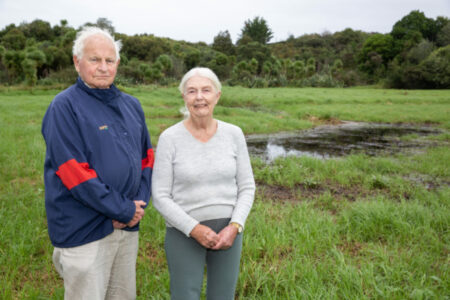
Residents are angry at the damage caused to an east Auckland park that left part of it looking like a “swamp”.
The problem in Macleans Park at Eastern Beach is being highlighted by locals including Sandra McGill, who chairs the Eastern Beach Action Network (EBAN), and retired geologist Graham Mansergh, who advises the group.
McGill told the Times the problem stems from damage caused by work done on behalf of Auckland Council and the Howick Local Board.
She says rather than clear a blocked stream, a new stream channel was constructed, “which has caused a terrible mess”.
“Part of the site is used for recreation and part for overflow parking, but both contain 4000-6000 year old scientifically significant chenier ridges, which are soon to be evaluated as an Outstanding Natural Feature.”
McGill and Mansergh say chenier ridges, also known as chenier plains, are found at the back of beaches and are formed by wave action.
They occur in front of low-lying land and indicate prehistoric sea levels, hence their historical significance.
“Both the department in council responsible for the work in that area and the Howick Local Board, which allowed it to happen, knew about the importance of this site,” McGill says.
She’s written to board chairperson Damian Light about her concerns, requesting funding be set aside to address issues affecting the area containing the chenier ridges, which she describes as “scientifically important”.
“A stream in this area – the stormwater outlet for a large catchment – was blocked with willow trees,” she told Light.
“After Graham Mansergh, a retired geologist, and I did a deputation to the board about this in March 2019, Healthy Waters planned to clear the stream channel, but this did not go ahead.
“Unfortunately, it was decided to create a new channel, and because a bund alongside prevents water from draining into that channel, a large swamp has developed.”
Mansergh adds: “’There were about four less well-developed ridges behind the main ridge, and both earthworks and flooding have partially or completely destroyed them.”
Doug Pirini, operations south team leader of the council’s Healthy Waters Lifecycle team, says the existing channel at Macleans Park became blocked with silt and vegation, causing flooding on the lower fields.
Healthy Waters was advised resolving the problem required resource consent, he says.
“As part of that process, we were advised the area through which the original channel flowed was a significant ecological area.
“Following an archaeologist report which considered chenier plains or any other areas of significance, the decision was made to create the channel along the edge of the vegetation, while removing willows along the channel path, to reduce environmental impact.”
He says the area is an “overland flow path and floodplain” which will always be prone to water-logging after heavy rain and over winter.
“However, the area has been greatly improved by the new channel, as flows from upstream are now being directed to the main stream, rather than dispersing across the lower fields area.”
Howick Local Board chairperson Damian Light says the board recognises McGill’s passion for the chenier plain in Macleans Park and it’s heard her requests for more investment in the area.
He says one of the strategic outcomes in its Local Board Plan is that the natural environment is protected, restored and enhanced.
“It’s clear from the recent [council] annual budget consultation that continuing to invest in the protection and restoration of our natural environment is important to locals.
“Unfortunately, we’re facing a significant reduction in our budget – almost half our discretionary funding – and the reality is we won’t be able to deliver or support everything we have in the past.
“We must address this immediate issue before we can take on more.”
Light says the board will soon ask for feedback on its next Local Board Plan, which will “unlock new opportunities for environmental programmes”.









